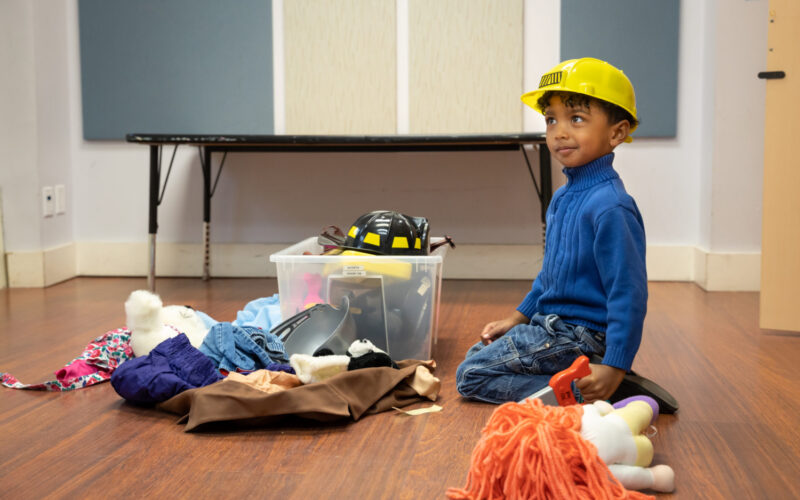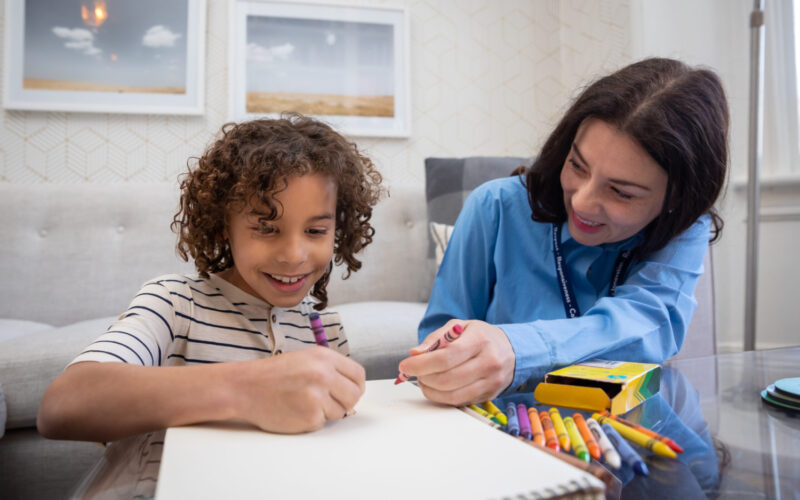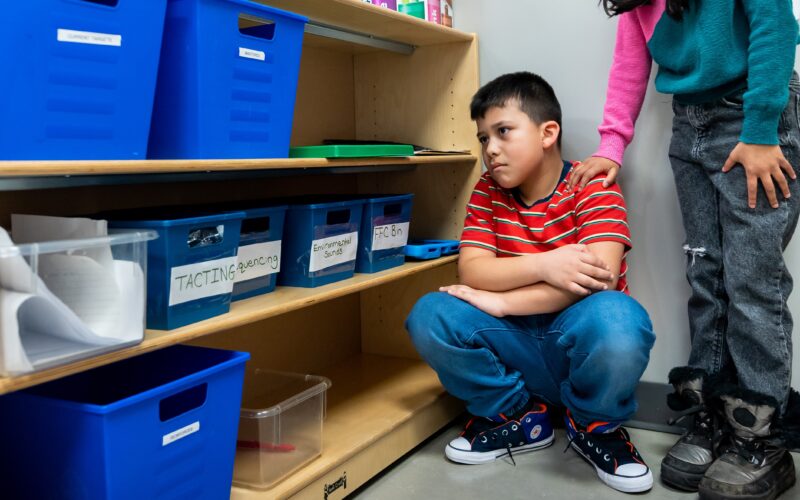As a caregiver, your participation in your child’s therapy can have a huge impact on their learning. A behaviour therapist spends limited hours with your child, but you are a consistent presence. For this reason, some Surrey Place services are structured so that you deliver the therapy directly to your child in your home. This is called the mediator model.
The goal of the mediator model is to teach skills to your child by providing training and support to a parent, caregiver or family member. We call this person the “mediator”. The mediator should be the person that spends the most time with your child and is available to attend training sessions.
Once you are registered in a service that uses the mediator model, a clinician called a “trainer” will teach you therapeutic and information-gathering methods to use at home. The trainer works closely with the parent, caregiver or family member to build their skills using behaviour skills training (BST).
What is Behaviour Skills Training?
The goal of BST is to encourage you to carry out the behaviour plan by yourself, without the help of the trainer. The idea is for your child to receive consistent treatment. This will help make the behaviour plan a success. The trainer will provide you with a checklist to help identify where you need to boost your skills training.
Behaviour skills training consists of four steps:
- Explaining: During this step, the trainer will explain the skill. This includes why they are teaching that skill and the steps they will follow.
- Modeling: During this step, the trainer will demonstrate the skill. They will either model the skill with your child (if they are present) or have you play the role of the child.
- Rehearsing: After the trainer models the skill, you will rehearse the skill together. This might include “roleplay”. Roleplay is when the trainer pretends to be the child so you can practice the skill. After you have rehearsed the skill, the trainer will give you advice on things to work on. They’ll let you know what worked and what areas can be improved.
- Mastery: The trainer will review the first three steps with you. Together, you will practice them until you feel confident you can do it on your own.
The mediator model is hugely beneficial for both the mediator and the child. Once you have finished behavioural skills training, you will be able to provide a consistent and structured environment for your child at home. If you are on the waitlist for services, BST will support you while you wait by setting you up with coping and behaviour management strategies.
Most importantly, BST helps children successfully learn and reinforce skills while empowering caregivers. For families with less urgent behaviour challenges, the aim of BST is to help you feel more confident in teaching your child skills while implementing their behaviour plan.
For families experiencing urgent behaviour challenges that are new or escalating, BST can help you introduce immediate changes into your child’s environment that can have a huge impact very rapidly.
What is data collection?
Data collection sounds intimidating, but it is actually quite simple. It involves taking notes throughout the day about your child’s behaviour and any changes that upset them. When you bring the data to your appointment, the information you collected helps your trainer better understand the circumstances surrounding your child’s behaviour. Here are some things you might be asked to write down:
- How often your child’s challenging behaviour occurs
- The intensity of the challenging behaviour
- Whether anyone was injured when the behaviour occurred
- If there are certain times of day when the behaviour occurs
- Whether the behaviour is tied to a specific person, activity or transition
This information is important because:
- It allows behaviour analysts to identify patterns and determine the function of challenging behaviours.
- It helps behaviour analysts assess whether your child’s challenging behaviour is predictable or not. Predictable behaviour will be preceded by an event.
- Understanding the function of behaviour helps the trainer figure out which socially appropriate skills your child must learn. The goal is for these skills to replace the challenging behaviour.
- The information you gather helps your clinical team make informed decisions. These decisions are based on whether challenging behaviour is decreasing or increasing and whether new behaviours are appearing.
What time commitment is required?
The time commitment expected for a mediator model-based service will vary depending on your child’s needs. The Surrey Place team might meet with you once or twice a week for anywhere from one to three hours at a time.
As your training progresses and you master the skills being taught, you may require less frequent meetings with your clinical team. If at any point there is a change in your child’s behaviour, your team will meet with you to adjust the behaviour plan as needed to make sure it continues to support your child.
When determining your capacity to participate in the mediator model, Surrey Place’s clinical team will consider:
- Your family situation (for example, how many children are in your household and the demands you are managing)
- The needs of your child
- Your work schedule and your family’s schedule
About Urgent Response Services
This resource was written with support from staff in Urgent Response Services. Urgent Response Services are part of the Ontario Autism Program. It was created to support children or youth with an emerging urgent need. Surrey Place leads Urgent Response Services for Toronto Region in partnership with 2-Spirited People of the 1st Nations, Community Living Toronto, Family Service Toronto, Geneva Centre, Holland Bloorview, Kerry’s Place, Lumenus, SAAAC, SMILE Canada and Strides Toronto.
How Surrey Place can help
If you’re a parent or caregiver whose child has new or escalating high-risk behaviours that require an urgent response, like self-injury, aggression, or property destruction, you may be eligible for Surrey Place’s Urgent Response Services. This program is accessed through the Ontario Autism Program (OAP). Urgent Response Services offer brief, rapid support from a multidisciplinary team to quickly address new behaviours that have been emerging in the last 14 days or less. Through Urgent Response Services, you can receive training in the mediator model approach.
Aside from Urgent Response Services, the following Surrey Place services also use the mediator model approach:
- TRE-ADD School-Based Services
- Parenting Enhancement Program
- Occupational Therapy
- Behaviour Therapy
- Speech-Language Pathology
- Caregiver-Mediated Early Years Services
- Foundational Family Services
For support for a child with autism spectrum disorder whose needs are not urgent, please visit Surrey Place’s Autism Services page.
Resources for Parents and Caregivers
Along with the mediator model, another important tool for addressing challenging behaviours is learning to recognize triggers. These can include social, psychological and environmental factors. If you enjoyed this article, you may also find other behaviour resources useful including:
- Strategies for Handling Challenging Behaviours
- How to Get Started with Toilet Training
- How to Safely Navigate Social Media
If you suspect your child’s behaviour is triggered by physical discomfort, you may find these resources useful:
- How to Encourage Healthy Sleep
- Tips for Encouraging Healthy Eating
- Beginner’s Guide to Nutrition
- Simple Ways to Stay Hydrated During the Summer Months
If you suspect your child’s behaviour is triggered by anxiety, you may find How to Support an Anxious Child useful.
If you suspect your child’s behaviour is triggered by transitions, you may find these resources useful:
- Tips for Helping Your Child Transition Between Activities
- How to Set Up an IAS in the Home
- Tips for Teaching Executive Functioning Skills
- How to Use a Visual Schedule to Support Routines
More on the Mediator Model
Urgent Response Services are funded by Ontario Autism Program to support children or youth with an emerging urgent need. Surrey Place leads Urgent Response Services for Toronto Region in partnership with 2-Spirited People of the 1st Nations, Community Living Toronto, Family Service Toronto, Geneva Centre, Holland Bloorview, Kerry’s Place, Lumenus, SAAAC, SMILE Canada and Strides Toronto.


